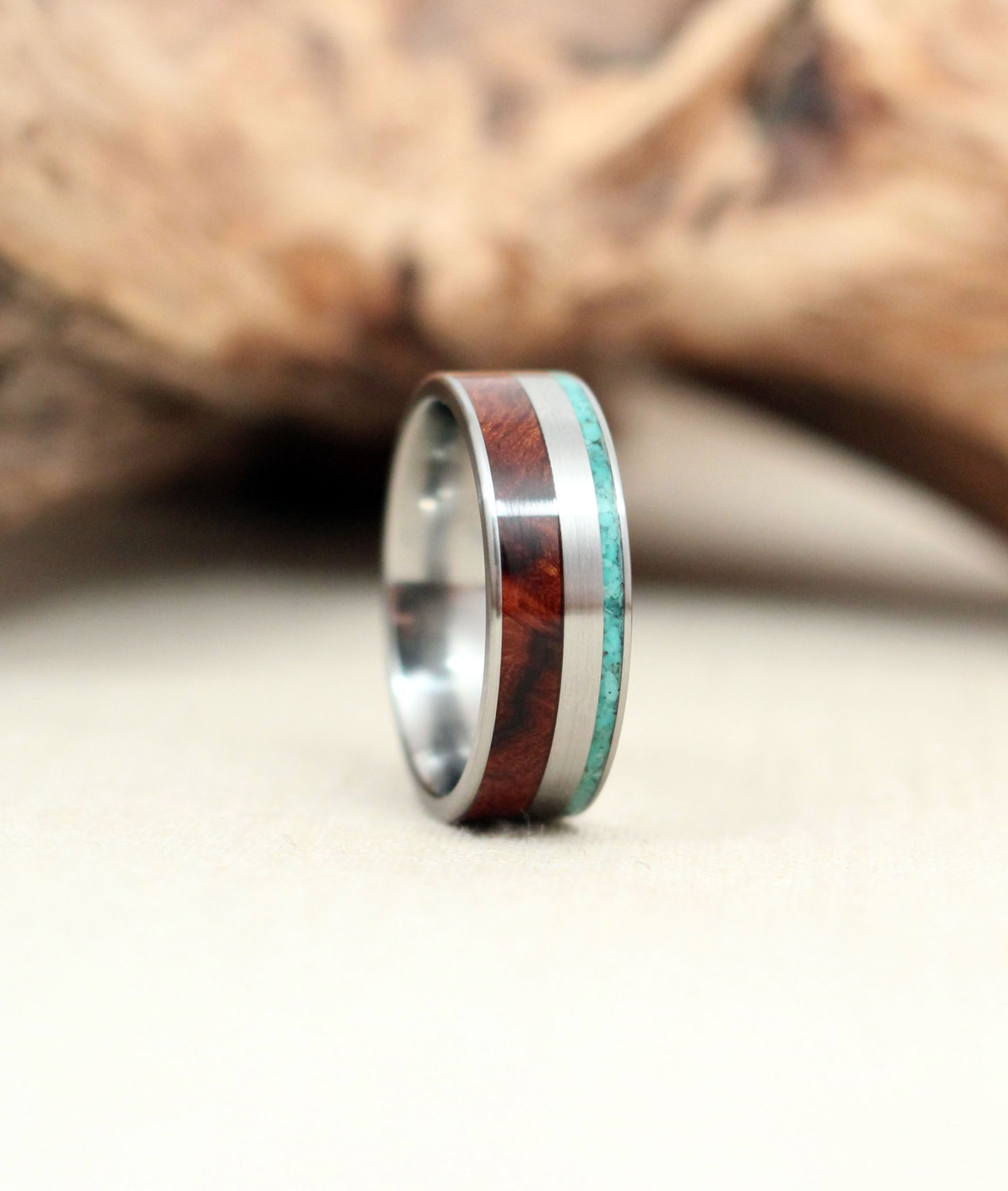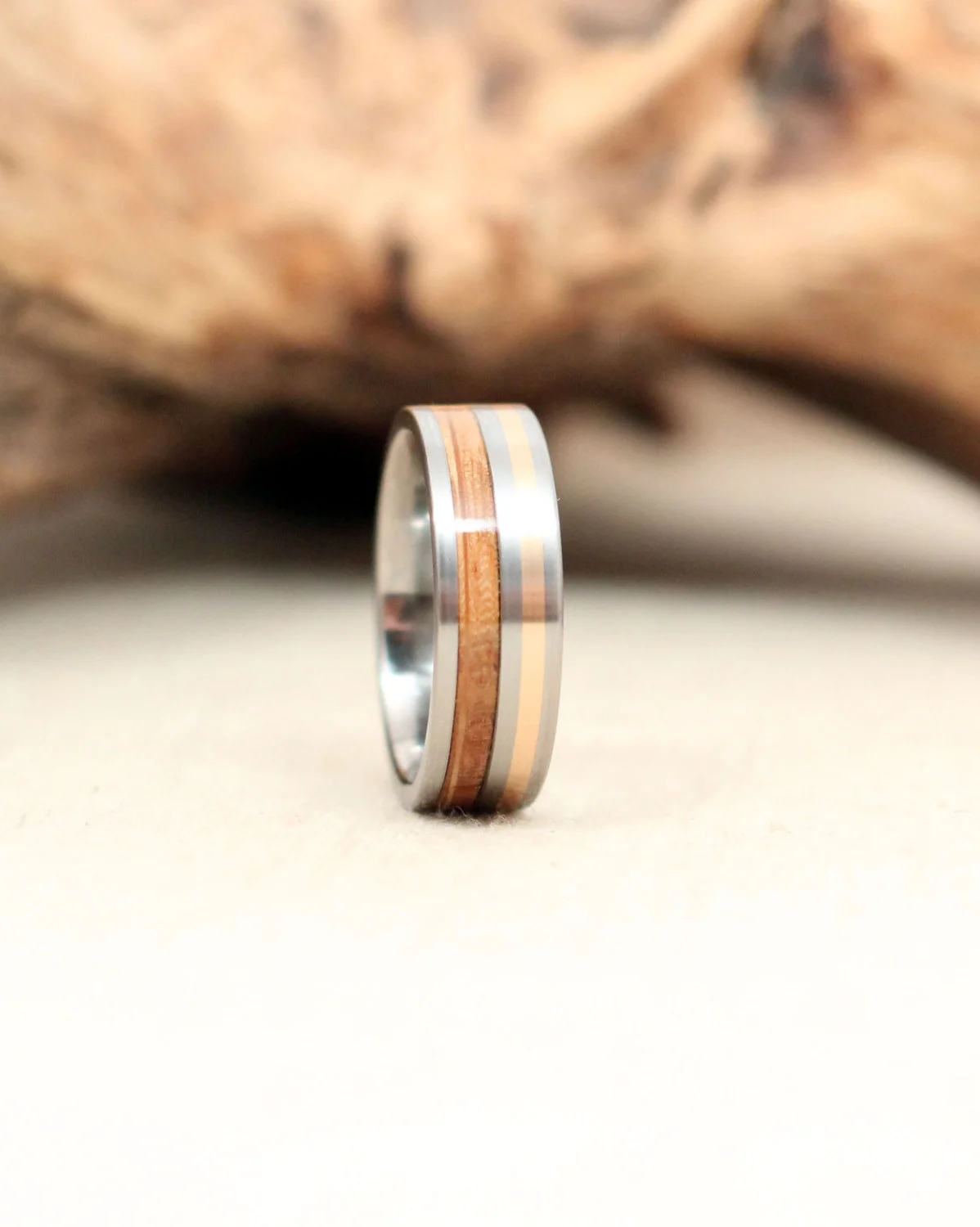Comparing Metals for Wood Rings
Which Metal Should I Choose for my Wood Ring?
When shopping for a unique, one of a kind wedding band, many come across the idea of a wood ring. No two such rings are ever alike, and it stands out more than the traditional, plain wedding band. To enhance it's durability, a metal component is ideal. This leads to probably one of the most pressing questions for someone who has decided to purchase a wood and metal ring: “which metal is right for me?” From the standpoint of aesthetics, the choice is straightforward. If you love the non-traditional and striking appearance of a black ring and want a wood interior, black zirconium is the material for you! If you want your ring to resemble a traditional white gold or platinum ring, you are going to favor cobalt. However, beyond the purely visual impression each material gives, there are many factors one might want to consider when choosing a wood and metal ring.
Titanium and Wood Rings
Titanium has become an increasingly popular choice for those with metal allergies. It is completely hypoallergenic and biocompatible. It is fairly scratch resistant, much more so than gold, earning titanium a 950MPa on the Vickers Hardness Test scale while gold scores a mere 200. It is also resistant to corrosion or tarnish, unlike silver- even in salt water! It is very lightweight and, if you choose a satin finish, doesn't give off much of a shine, making it a comfortable fit for those who don't normally wear jewelry, or don't like anything too flashy.
If you would like your ring to show more of the wood, or if you would like to add a stone inlay such as turquoise, titanium gives the wearer an opportunity to customize their wood ring, with a wood exterior and titanium - no sacrificing durability.
If you have heard any rumors that titanium can not be cut off in emergency situations, please put that out of your mind.. This may have at one time been true, but today it is just an urban myth. To read more about this ludicrous claim, click here.
Cobalt and Wood Rings
If you are someone who wants to stick with the traditional look of a wedding band, but want that wooden interior look, cobalt is probably the ideal metal for you. It is similar to white gold or platinum in appearance, but is about four times harder than platinum, with an MPa of 1043 on the hardness scale. Similar to titanium, it is hypoallergenic and biocompatible. However, in many circumstances under which a titanium ring might scratch, cobalt will not.
Cobalt is another metal that can be customized with exterior inlays to enhance your wood ring. A Mokume-gane or gold inlay can be added such as in these styles here:
http://www.wedgewoodrings.com/purchase/cobalt-mokume-gane-whiskey-barrel-oak-wooden-ring
And if you are one who wants to show the wood of the ring inside and out, cobalt offers that chance as well:
http://www.wedgewoodrings.com/purchase/kingwood-and-cobalt-wooden-ring
Black Zirconium and Wood Rings
Probably the most strikingly non-traditional metal I offer in my shop would be the black zirconium. This has been favored amongst those who want something a little “edgier” for their wood ring. The zirconium is heat treated until the extreme heat causes oxidization, forming a very hard, durable black coating. This coating has a hardness rating of 1940MPa - the same as sapphire. Although it is very scratch resistant, if it scratched deeply enough, it can reveal the natural silver coloring of the zirconium underneath and is therefore not ideal for those who have a higher tendency to scratch phone screens, watch faces, etc.
For those who like a little flare to their black zirconium and wood ring, a 2 point precious stone inlay (including diamond, ruby, sapphire etc.) can be added:
Tungsten Carbide and Wood Rings
Tungsten Carbide, with an incredible 2600MPa on the hardness scale, is one of the most sought after metals if you value its unparalleled scratch resistance. Because it is 10x harder than gold, and 5x harder than steel, it makes for a perfect match for a wood ring as it will not bend or deform in any way. It can be filed or hammered, and not only will it not scratch, but it will maintain its perfect shine. Because of its density, however, it makes it heavier. MUCH heavier than titanium, for example. One factor to consider when shopping for a tungsten carbide ring with a wooden component is the relationship between hardness and brittleness. As with all superhard materials, a tungsten carbide ring, if it is dropped from head height onto concrete, has a good chance to crack. All rings in my shop are made using only US sourced materials, so the tungsten carbide I use does not crack easily, as comparable, cheap Chinese, poorly casted rings do.
http://www.wedgewoodrings.com/purchase/tungsten-carbide-ring-with-bourbon-barrel-oak-stave-wood-ring
Damascus Steel and Wood Rings
Damascus steel is my personal favorite amongst these metals. It is incredibly scratch resistant and heavier, making it ideal for tougher lifestyles. Damascus is made from many layers to create a stronger, superior metal. Throughout history and fantasy, this was the preferred choice for superior weapons- nothing says manly like blade steel.
If the word “steel” makes you nervous for fear of it rusting- not to worry. The natural oils in the skin as well as the quality steel alloys used in these rings actually prevent it from rusting.
I offer a few different styles of damascus to add to your wood ring. The CNC damascus is cut by machine, and there are little variations. It is brighter in color, and lightweight. Alternately, the hand wrought damascus is unique because it is like fingerprints- no two rings are ever alike. This makes it special to pair with wood, as both pieces are strictly one of a kind. It is also heavier and much more durable than the machine made damascus.
Black Ceramic and Wood Rings
Black ceramic is an ideal choice for electricians as it is non-conductive. It is extremely durable and scratch resistance, with a 2035MPa on the Hardness scale, making it more durable than any metal except tungsten carbide. Unlike the black zirconium, the black ceramic color is not coated- that is to say it is black through and through. Should it get scratched (which is unlikely), it will not reveal a different color underneath. This makes it a good choice for those who are more likely to scratch phone surfaces, watch faces, etc, but also like the black coloring. It makes for a handsome contrast with a wood ring:
http://www.wedgewoodrings.com/purchase/black-ceramic-ring-with-exhibition-grade-hawaiian-koa
Now, what is so wrong with traditional ring materials such as gold, silver and platinum that I don't like to pair them with my wood rings? Here's why:
Gold
The only thing nice about gold is the aesthetic. With a pitiful 200MPa on the Vickers Hardness Scale, it's just too soft. It scratches VERY easily, and is extremely malleable, meaning that over time it will bend, contort, and end up molding to the shape of your finger and unable to pass the knuckle. For a wood ring, this is just not an ideal match (unless strengthened with cobalt!), as to make the wooden portion more durable, the metal needs to be a sturdy material. Not only that, but it is, inexplicably in my view, EXPENSIVE! However, for those who just can't shake their love of gold, it makes a nice touch to a more durable titanium style, like this pinstripe ring:
If you must have solid gold, it is an option. Please consult this blog post before placing your order.
Sterling Silver
Like gold, it is a softer metal, making it prone to scratches, dents, and warping. It has an MPa of 250, making it only slightly more durable than gold. It also tarnishes easily- a five year old ring can look about twenty years old in person. The finish you choose won't last- a polished finish over time will become matte, and a satin finish will become brighter. Silver requires a lot of maintenance such as polishing, buffing, etc, to keep it looking nice.
Platinum
Out of the traditional materials, platinum is by far the best choice, with a 450-500MPa on the Vickers Hardness scale. However, platinum is even more expensive than gold, with not much more benefits than gold. While it won't corrode or tarnish like silver will, it will still scratch relatively easily. It will also lose its shine and sparkle over time.
While the traditional metals are nice at first, they just don't compare to cobalt, tungsten, damascus, or the other precious metals I've mentioned. They're extremely high maintenance, and are just unlikely to stand up to the test of time while still looking nice. My goal in combining these metals with wood rings is to give my customers an eco-friendly, hypoallergenic, and unique option that will last decades, while still looking brand new.











